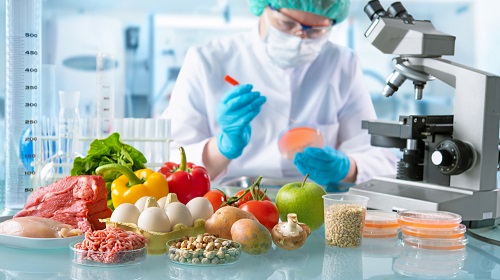Gene Modification in Produce
Food has been genetically modified since the 1990’s, with tomatoes being the first brought to market. Changes were made within the DNA of the tomatoes causing them to grow faster, larger, and be resistant to pests. Using CRISPR gene editing techniques, we now genetically modify plants and animals using DNA from other species. For example, bacteria DNA is used to modify potatoes, cattle DNA is used to modify salmon, even human DNA is used to modify pigs. These genetically edited products now dominate the produce section (ex. corn, soy products, apples, squash, pineapple), the fresh pork and farmed salmon we buy, and even the packaged food, now labeled as “bioengineered” products (Campbell Soups, oils, sugars).
GMO feed is given to all the animals we eventually eat, including beef and chicken. Also, genetically modified living soil microbes are currently being used to kill pests and fertilize plants. This provides minimal advantages, and it is probable these living soil microbes will “move across species and geographic boundaries” with unknown consequences. Why is this allowed? The Pesticide, Agriculture and Pharmaceutical industries are powerful lobbyists that benefit financially from this kind of farming/ranching. It produces larger crop yields, more robust animals, less weeds, less disease, better looking products and extreme cost savings. All of these techniques and products are patentable, which translates into trillions of dollars of profit.
GMO Regulation and management from our government is sparse. Companies are left to monitor their own quality control. The US has not produced a single academic study showing safety, and there are no long-term trials. Even the FDA admits this continues to be a “25+ year-long experiment using humans, wildlife and the environment as test subjects.” In contrast, hundreds of international studies have shown harm to all three, and this has led to many countries limiting or banning bioengineered food. The bottom line…conventional farming has been shown to produce safer food in comparable quantities.
The first time a bioengineered product was FDA approved to be used IN the processing of food was in 1990. What was it? A bio synthetic RENNET enzyme, made by Pfizer using gene editing. YES, THAT PFIZER. What is rennet? It is a clotting agent (traditionally from the stomachs of ruminant animals (cows)) necessary to make CHEESE. This method is cheaper than using animal rennet, and it ages cheese faster. In fact, 90% of all cheese sold today in North America is bioengineered, and it is not required to be labeled as such. The safety of this rennet was evaluated using rats, not humans, in one 90-day trial. However, post marketing findings show toxicity in humans (in the form of digestive and respiratory issues) due to allergic reactions.
Vaccines within Food, namely Transgenic Edible Vaccines using Mod-mRNA.
Although researchers have been working towards the oral delivery of vaccines for over 20 years with little success, the National Institute for Health (NIH) gave the green light for testing “Edible Vaccines” for human consumption in 2020. At the University of California in Riverside, and UC San Diego, the National Science Foundation (NSF) has funded growing modified mRNA vaccines in lettuce for human inoculation.
The red flags include difficulty keeping the altered genes from cross pollinating with other plants, the potential to change insect and wildlife DNA, as well as difficulty in managing dosing of the vaccine to individuals. Because this would engineer a plant that elicited an immune response, this “food as medicine” venture is particularly risky. Proponents believe that the manufacturing would be cheap, and the form of delivery may increase compliance. In contrast, Bioethicists agree this plan would violate the Nuremberg Code on Medical Experimentation, International Environmental Laws, and the Biological Weapons Anti-Terrorism Act.
The Belmont principles of Informed Consent, Beneficence and Justice would be breached unless long term studies are completed, regulatory oversight is strict, and the public is scrupulously informed with labeling and education. Humanity already has proof that modified mRNA vaccines are dangerous, as documented in hundreds of thousands of patients harmed and killed by them in the context of the recent pandemic.
Genetically Modified Meat
Merck Pharmaceuticals has been providing Modified mRNA vaccines to inoculate food-chain pigs against viruses (swine flu) since 2018. Americans have been eating gene edited pork for over 5 years now, and not even knowing it. So far, no advantage over traditional vaccines has been shown. In hopes of flushing out the mRNA before consumption, farmers are asked to wait 21 days after inoculation before processing the pig meat. However, we know from human C-19 vaccine studies, the mRNA has been found in organs up to 2 years after inoculation. Alarmingly, clinical trials in China have found vaccine mRNA in cow milk. No other studies have proven the mRNA is not transmissible. Therefore, there is no guarantee consumers are not receiving the modified genes.
Several states have restricted the use of modified mRNA in consumable farm animals, including ND, AZ, TN, ID, and MO. Others require full disclosure to the public so informed consent can be given. The majority of the meat Americans consume is from foreign countries, each of which have their own oversight. This foreign meat containing modified mRNA is not required to be labeled, and frequently is mixed with home grown meat, making informed consent impossible.
“Lab grown meats are the “epitome of ultra-processed food”, which have been directly linked to causing serious diseases (obesity, heart attacks, cancer), and death. These fake meat products do not contain the nutrients that natural animal meat provides because their primary source is “genetically engineered soy starches, various new synthetic proteins and unhealthy kinds of fats…poly and monounsaturated.” Unlike real meat, they provide no collagen, a vital protein for your entire body. There are no long-term health studies yet.
Citations:
- https://childrenshealthdefense.org/defender/davos-wef-gmo-soil-microbes/
- https://careygillam.substack.com/p/mexico-smacks-us-over-gm-corn-and
- https://childrenshealthdefense.org/defender/pfizer-gmo-rennet-cheese-us-cola/
- https://wgntv.com/news/vaccines-in-your-salad-scientists-growing-medicine-filled-plants-to-replace-injections/
- https://childrenshealthdefense.org/defender/thomas-massie-fda-usda-transgenic-edible-vaccines/
- https://www.tandfonline.com/doi/pdf/10.1080/07315724.2002.10719268
- https://childrenshealthdefense.org/defender/pork-merck-mrna-livestock-vaccine-cola/
- https://www.eurasiareview.com/02042024-a-fauci-for-every-farm-animal-oped/

